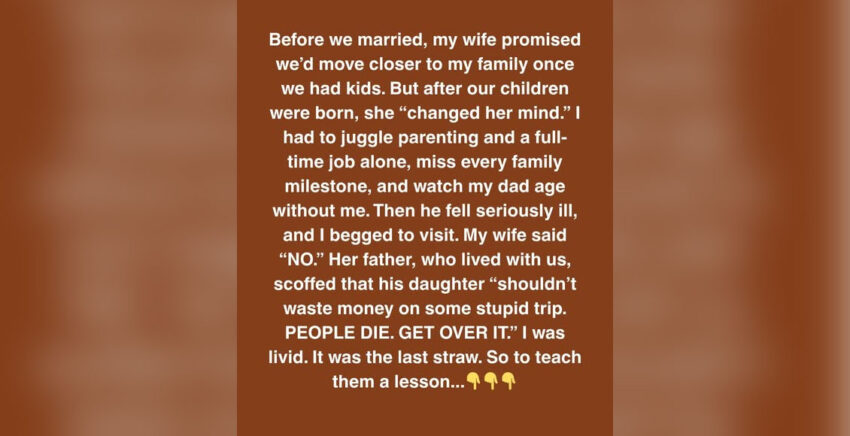Before we married, my wife promised we’d move closer to my family once we had kids. But after our children were born, she “changed her mind.” I had to juggle parenting and a full-time job alone, miss every family milestone, and watch my dad age without me. Then he fell seriously ill, and I begged to visit. My wife said “NO.” Her father, who lived with us, scoffed that his daughter “shouldn’t waste money on some stupid trip. PEOPLE DIE. GET OVER IT.”
I was livid. It was the last straw. So to teach them a lesson, I quietly started setting money aside every month. I sold some of the things I’d inherited but never had the chance to take back home. My old coin collection, a watch my grandfather gave me—anything that wouldn’t raise alarms if it disappeared. Each time I looked at those items, it felt like a piece of my identity slipping away, but I kept telling myself it was for something bigger.
I stopped eating out at lunch and started packing sandwiches, saving every penny. I even took on a few freelance jobs late at night after everyone else went to bed. My wife never noticed how little sleep I was getting; she just complained I was “grumpy” in the mornings. There were times I almost cracked and told her what I was planning, but I remembered the bitterness in her father’s voice, the way he spat out “people die” like my father was just another statistic.
Finally, after almost a year of scraping and sacrificing, I had enough to buy a plane ticket and stay in my hometown for a month. I booked the trip for the day after my son’s seventh birthday, figuring it would cause the least disruption. But as the date approached, I started feeling torn. I knew leaving my kids behind would hurt them, but I couldn’t bear the thought of not seeing my father before it was too late. I decided to be honest with my children, telling them Grandpa was very sick and Daddy needed to say goodbye.
My daughter, Rhea, just five years old, cried and asked if Grandpa would come live with us when he got better. My heart shattered as I hugged her. I told her Grandpa might not get better but that I’d be back soon. When I told my wife, her eyes went wide, and her jaw clenched so tight I thought her teeth would crack. She demanded to know where I got the money. I said nothing. She called me selfish, said I was abandoning my responsibilities, that my priorities were “all wrong.” Her father chimed in from the recliner, calling me an “ungrateful whelp.”
I left two days later anyway, my suitcase packed with more emotion than clothes. When I arrived at my parents’ house, I found my dad thinner than I remembered, his skin like parchment and his eyes barely able to focus on mine. But when he saw me, he smiled weakly and squeezed my hand. It was the first time I’d felt truly alive in years. My mom hugged me so tight I thought I’d break. She told me Dad had been asking for me every morning, worrying he’d never see me again. We spent hours just sitting together, reminiscing, watching old family videos, and sometimes just holding hands in silence.
Each day, I cooked meals, cleaned up, and helped my mom with things my dad used to handle. I realized how much they’d both been struggling without me around. The first week passed in a blur of hospital visits and late-night talks with my mom about the old days. I started noticing how many family friends dropped by, bringing food or offering help. They’d all heard about my wife refusing to move closer, and a few even whispered that I deserved better. It made me angry and sad at the same time. I didn’t want pity; I just wanted peace.
One afternoon, while I was out running an errand for my parents, my wife called. She screamed at me for leaving her “to deal with everything” on her own. Our son had gotten a stomach bug, and she blamed me for not being there to help. She said I was a terrible husband and father. Her words stung, but I noticed she never once asked how my dad was doing. That silence told me everything I needed to know. I hung up shaking with rage and heartbreak.
The night after that call, I sat by my father’s bed. He woke up, looked at me, and asked if I was happy. His voice was thin, but his eyes were clear. I hesitated, then told him the truth: I wasn’t. I felt like I was drowning in a marriage where I wasn’t seen or valued. He patted my hand and said, “Life’s too short to spend it with people who don’t respect your heart.” I cried until I couldn’t breathe.
A few days later, my dad took a turn for the worse. The doctors told us it was a matter of days. I stayed by his side every moment, whispering stories, playing his favorite songs, and just being there. On his last night, he looked at me with a small smile and said, “Thank you for coming home.” Then he slipped away, and the world felt like it stopped. The funeral was beautiful but gut-wrenching. My childhood friends and relatives came, sharing stories about my dad I’d never heard. In those moments, I felt a sense of belonging I hadn’t known in years.
